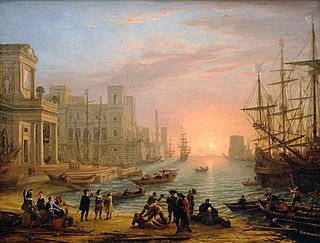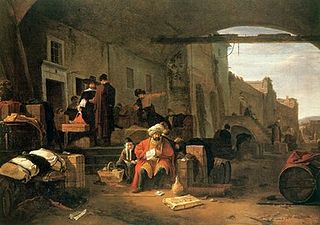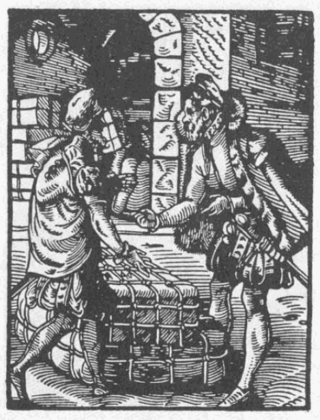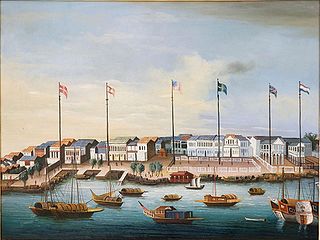Related Research Articles

The Hanseatic League was a medieval commercial and defensive network of merchant guilds and market towns in Central and Northern Europe. Growing from a few North German towns in the late 12th century, the League expanded between the 13th and 15th centuries and ultimately encompassed nearly 200 settlements across eight modern-day countries, ranging from Estonia in the north and east, to the Netherlands in the west, and extended inland as far as Cologne, the Prussian regions and Kraków, Poland.

Mercantilism is a nationalist economic policy that is designed to maximize the exports and minimize the imports for an economy. In other words, it seeks to maximize the accumulation of resources within the country and use those resources for one-sided trade.

A merchant is a person who trades in commodities produced by other people, especially one who trades with foreign countries. Merchants have been known for as long as humans have engaged in trade and commerce. Merchants and merchant networks operated in ancient Babylonia, Assyria, China, Egypt, Greece, India, Persia, Phoenicia and Rome. During the European medieval period, a rapid expansion in trade and commerce led to the rise of a wealthy and powerful merchant class. The European Age of Discovery opened up new trading routes and gave European consumers access to a much broader range of goods. By the 18th century, a new type of manufacturer-merchant had started to emerge and modern business practices were becoming evident.

Trade involves the transfer of goods and services from one person or entity to another, often in exchange for money. Economists refer to a system or network that allows trade as a market.

The East India Company (EIC) was an English, and later British, joint-stock company founded in 1600 and dissolved in 1874. It was formed to trade in the Indian Ocean region, initially with the East Indies, and later with East Asia. The company gained control of large parts of the Indian subcontinent and colonised parts of Southeast Asia and Hong Kong. At its peak, the company was the largest corporation in the world by various measures and had its own armed forces in the form of the company's three presidency armies, totalling about 260,000 soldiers, twice the size of the British army at the time.

The Silk Road was a network of Eurasian trade routes active from the second century BCE until the mid-15th century. Spanning over 6,400 kilometers, it played a central role in facilitating economic, cultural, political, and religious interactions between the East and West. The name "Silk Road," first coined in the late 19th century, has fallen into disuse among some modern historians in favor of Silk Routes, on the grounds that it more accurately describes the intricate web of land and sea routes connecting Central, East, South, Southeast, and West Asia as well as East Africa and Southern Europe.

The First Opium War, also known as the Anglo-Chinese War, was a series of military engagements fought between the British Empire and the Qing dynasty of China between 1839 and 1842. The immediate issue was the Chinese enforcement of their ban on the opium trade by seizing private opium stocks from merchants at Canton and threatening to impose the death penalty for future offenders. Despite the opium ban, the British government supported the merchants' demand for compensation for seized goods, and insisted on the principles of free trade and equal diplomatic recognition with China. Opium was Britain's single most profitable commodity trade of the 19th century. After months of tensions between the two states, the Royal Navy launched an expedition in June 1840, which ultimately defeated the Chinese using technologically superior ships and weapons by August 1842. The British then imposed the Treaty of Nanking, which forced China to increase foreign trade, give compensation, and cede Hong Kong Island to the British. Consequently, the opium trade continued in China. Twentieth-century nationalists considered 1839 the start of a century of humiliation, and many historians consider it the beginning of modern Chinese history.

The Opium Wars were two conflicts waged between China and Western powers during the mid-19th century.

A merchant bank is historically a bank dealing in commercial loans and investment. In modern British usage it is the same as an investment bank. Merchant banks were the first modern banks and evolved from medieval merchants who traded in commodities, particularly cloth merchants. Historically, merchant banks' purpose was to facilitate and/or finance production and trade of commodities, hence the name "merchant". Few banks today restrict their activities to such a narrow scope.

Triangular trade or triangle trade is a historical term indicating trade among three ports or regions. Triangular trade usually evolves when a region has export commodities that are not required in the region from which its major imports come. Triangular trade thus provides a method for rectifying trade imbalances between the above regions.

The spice trade involved historical civilizations in Asia, Northeast Africa and Europe. Spices such as cinnamon, cassia, cardamom, ginger, pepper, nutmeg, star anise, clove, and turmeric were known and used in antiquity and traded in the Eastern World. These spices found their way into the Near East before the beginning of the Christian era, with fantastic tales hiding their true sources.

A merchant ship, merchant vessel, trading vessel, or merchantman is a watercraft that transports cargo or carries passengers for hire. This is in contrast to pleasure craft, which are used for personal recreation, and naval ships, which are used for military purposes.

The Levant Company was an English chartered company formed in 1592. Elizabeth I of England approved its initial charter on 11 September 1592 when the Venice Company (1583) and the Turkey Company (1581) merged, because their charters had expired, as she was eager to maintain trade and political alliances with the Ottoman Empire. Its initial charter was good for seven years and was granted to Edward Osborne, Richard Staper, Thomas Smith and William Garrard with the purpose of regulating English trade with the Ottoman Empire and the Levant. The company remained in continuous existence until being superseded in 1825. A member of the company was known as a Turkey Merchant.

The Canton System served as a means for Qing China to control trade with the West within its own country by focusing all trade on the southern port of Canton. The protectionist policy arose in 1757 as a response to a perceived political and commercial threat from abroad on the part of successive Chinese emperors.

The former communities of Jewish migrants and their descendants from Baghdad and elsewhere in the Middle East are traditionally called Baghdadi Jews or Iraqi Jews. They settled primarily in the ports and along the trade routes around the Indian Ocean and the South China Sea.

The Old China Trade refers to the early commerce between the Qing Empire and the United States under the Canton System, spanning from shortly after the end of the American Revolutionary War in 1783 to the Treaty of Wanghia in 1844. The Old China Trade represented the beginning of relations between the United States and East Asia, including eventually U.S.–China relations. The maritime fur trade was a major aspect of the Old China Trade, as was illegal trafficking in opium. The trade era overlapped the First Opium War, which resulted from an attempt by China to enforce its prohibition on opium smuggling by Western traders and blockade-runners.
The Gujarati people, or Gujaratis, are an Indian ethnolinguistic group who reside in or can trace their ancestry or heritage to a region of the Indian subcontinent primarily centered in the present-day western Indian state of Gujarat. They primarily speak Gujarati, an Indian language. While Gujaratis mainly inhabit Gujarat, they have a diaspora worldwide. Gujaratis in India and the diaspora are prominent entrepreneurs and industrialists and maintain high social capital. Many notable independence activists were Gujarati, including Mahatma Gandhi, Muhammad Ali Jinnah and Vallabhbhai Patel.
Mercery (from French mercerie, meaning "habderdashery" or "haberdashery" initially referred to silk, linen and fustian textiles among various other piece goods imported to England in the 12th century. Eventually, the term evolved to refer to a merchant or trader of textile goods, especially imported textile goods, particularly in England. A merchant would be known as a mercer, and the profession as mercery.
A hong was a type of Chinese merchant establishment and its associated type of building. Hongs arose in Guangzhou as intermediaries between Western and Chinese merchants during the 18–19th century, under the Canton System.

Bristol, a port city in the South West of England, on the banks of the River Avon, has been an important location for maritime trade for centuries.
References
- ↑ Chalmin, Philippe (1987), Traders and Merchants: Panorama of International Commodity Trading, Taylor & Francis, p. 6, ISBN 9783718604357
- ↑ J. N. Ball (1977), Merchants and Merchandise: The Expansion of Trade in Europe 1500-1630, Croom Helm, pp. 119–121, ISBN 9780312530082